Report: Analyzing Google's Organizational Behavior and Leadership
VerifiedAdded on 2022/03/17
|11
|3105
|37
Report
AI Summary
This report provides a comprehensive analysis of Google's organizational behavior, examining the influence of culture, politics, and power on team dynamics and performance. It explores the application of Hofstede's cultural dimensions, French and Raven's bases of power, and the impact of organizational structures on team interactions. The report delves into motivation theories, including Maslow's hierarchy of needs and goal-setting theory, evaluating their effectiveness in the context of Google's environment. Furthermore, it differentiates between effective and ineffective teams, analyzing team development theories like Tuckman's stages and Belbin's team roles. The study concludes by examining leadership concepts, specifically the path-goal theory, to understand how Google fosters a positive and productive work environment. This report is a detailed study of Google's practices and strategies in organizational behavior and leadership.
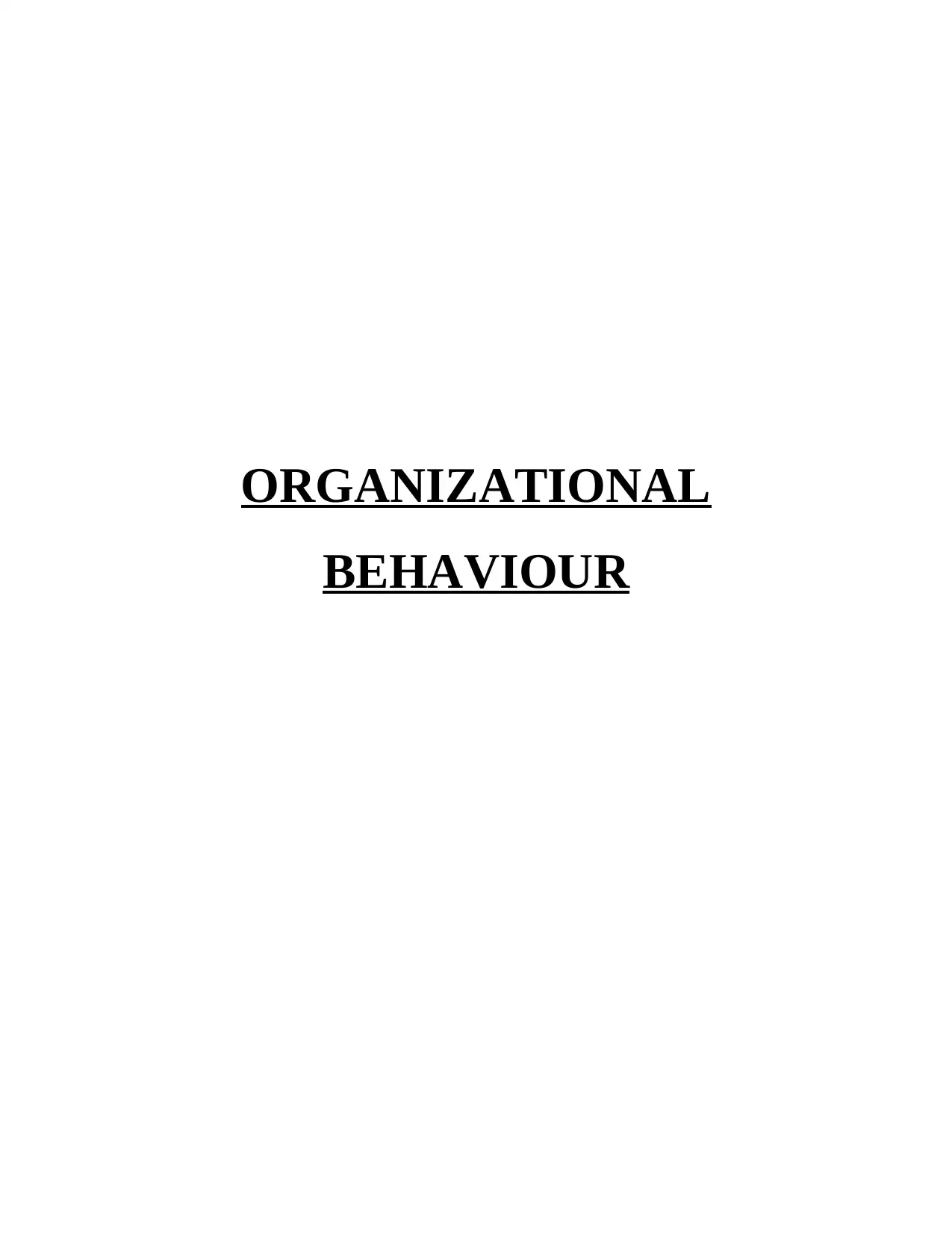
ORGANIZATIONAL
BEHAVIOUR
BEHAVIOUR
Paraphrase This Document
Need a fresh take? Get an instant paraphrase of this document with our AI Paraphraser
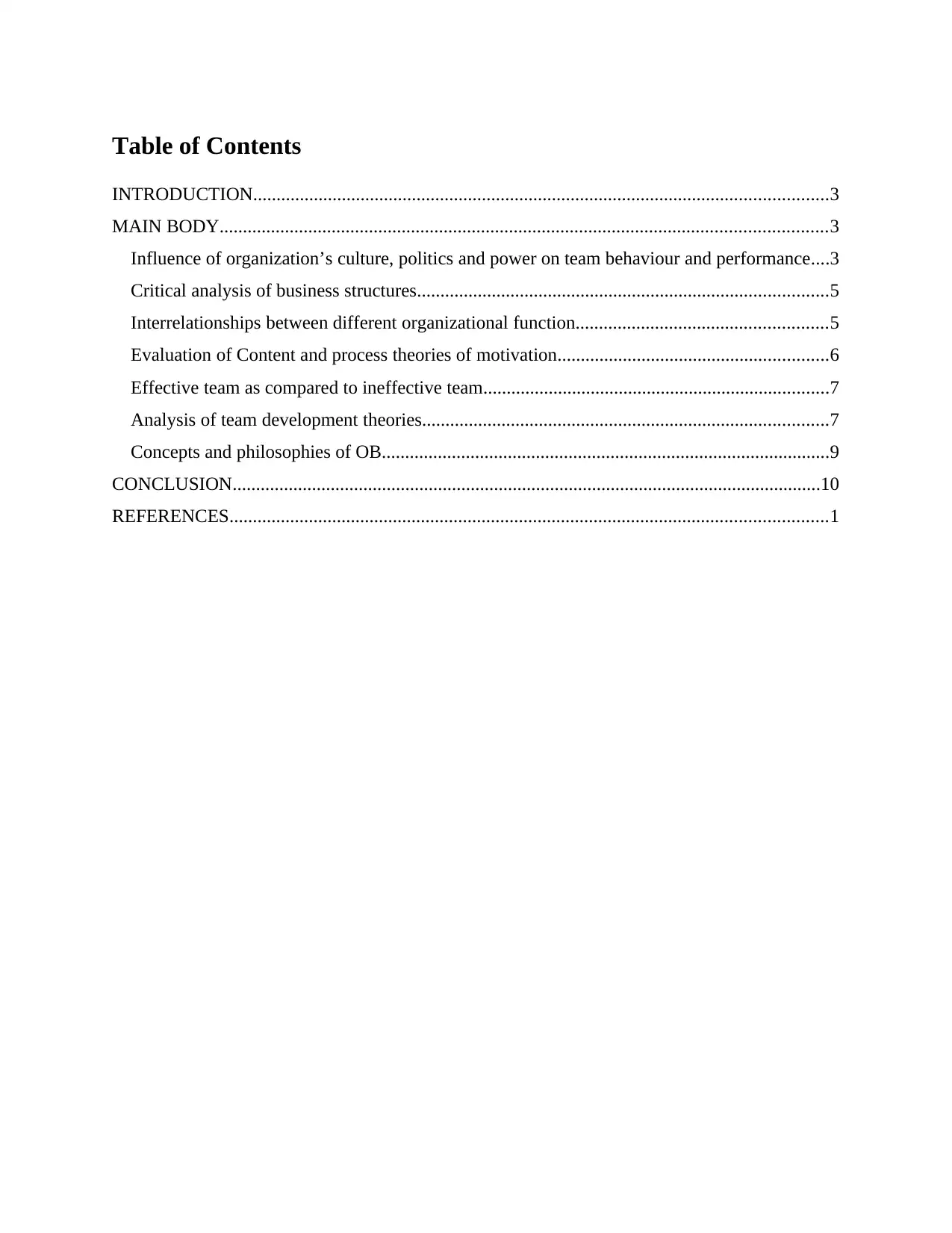
Table of Contents
INTRODUCTION...........................................................................................................................3
MAIN BODY..................................................................................................................................3
Influence of organization’s culture, politics and power on team behaviour and performance....3
Critical analysis of business structures........................................................................................5
Interrelationships between different organizational function......................................................5
Evaluation of Content and process theories of motivation..........................................................6
Effective team as compared to ineffective team..........................................................................7
Analysis of team development theories.......................................................................................7
Concepts and philosophies of OB................................................................................................9
CONCLUSION..............................................................................................................................10
REFERENCES................................................................................................................................1
INTRODUCTION...........................................................................................................................3
MAIN BODY..................................................................................................................................3
Influence of organization’s culture, politics and power on team behaviour and performance....3
Critical analysis of business structures........................................................................................5
Interrelationships between different organizational function......................................................5
Evaluation of Content and process theories of motivation..........................................................6
Effective team as compared to ineffective team..........................................................................7
Analysis of team development theories.......................................................................................7
Concepts and philosophies of OB................................................................................................9
CONCLUSION..............................................................................................................................10
REFERENCES................................................................................................................................1
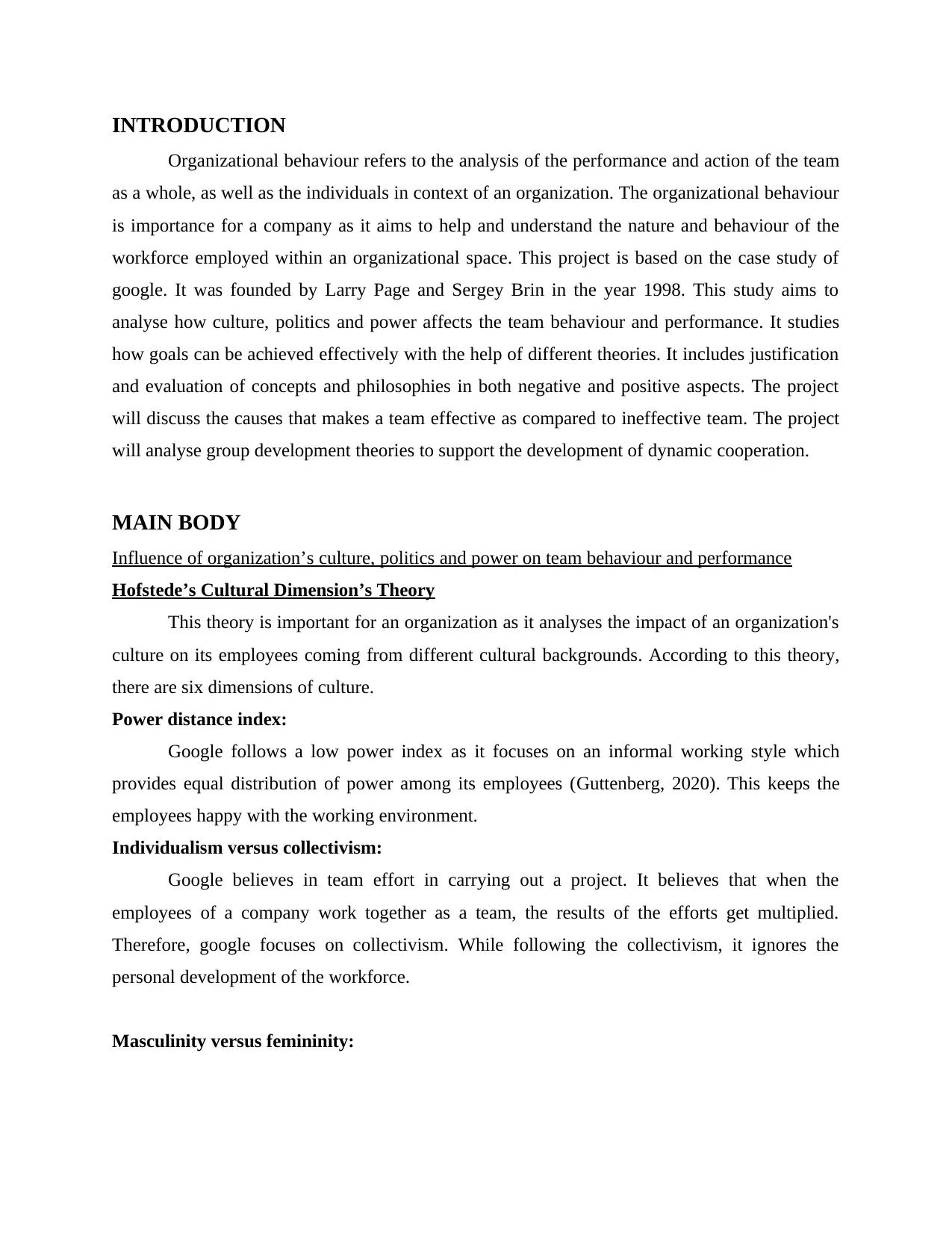
INTRODUCTION
Organizational behaviour refers to the analysis of the performance and action of the team
as a whole, as well as the individuals in context of an organization. The organizational behaviour
is importance for a company as it aims to help and understand the nature and behaviour of the
workforce employed within an organizational space. This project is based on the case study of
google. It was founded by Larry Page and Sergey Brin in the year 1998. This study aims to
analyse how culture, politics and power affects the team behaviour and performance. It studies
how goals can be achieved effectively with the help of different theories. It includes justification
and evaluation of concepts and philosophies in both negative and positive aspects. The project
will discuss the causes that makes a team effective as compared to ineffective team. The project
will analyse group development theories to support the development of dynamic cooperation.
MAIN BODY
Influence of organization’s culture, politics and power on team behaviour and performance
Hofstede’s Cultural Dimension’s Theory
This theory is important for an organization as it analyses the impact of an organization's
culture on its employees coming from different cultural backgrounds. According to this theory,
there are six dimensions of culture.
Power distance index:
Google follows a low power index as it focuses on an informal working style which
provides equal distribution of power among its employees (Guttenberg, 2020). This keeps the
employees happy with the working environment.
Individualism versus collectivism:
Google believes in team effort in carrying out a project. It believes that when the
employees of a company work together as a team, the results of the efforts get multiplied.
Therefore, google focuses on collectivism. While following the collectivism, it ignores the
personal development of the workforce.
Masculinity versus femininity:
Organizational behaviour refers to the analysis of the performance and action of the team
as a whole, as well as the individuals in context of an organization. The organizational behaviour
is importance for a company as it aims to help and understand the nature and behaviour of the
workforce employed within an organizational space. This project is based on the case study of
google. It was founded by Larry Page and Sergey Brin in the year 1998. This study aims to
analyse how culture, politics and power affects the team behaviour and performance. It studies
how goals can be achieved effectively with the help of different theories. It includes justification
and evaluation of concepts and philosophies in both negative and positive aspects. The project
will discuss the causes that makes a team effective as compared to ineffective team. The project
will analyse group development theories to support the development of dynamic cooperation.
MAIN BODY
Influence of organization’s culture, politics and power on team behaviour and performance
Hofstede’s Cultural Dimension’s Theory
This theory is important for an organization as it analyses the impact of an organization's
culture on its employees coming from different cultural backgrounds. According to this theory,
there are six dimensions of culture.
Power distance index:
Google follows a low power index as it focuses on an informal working style which
provides equal distribution of power among its employees (Guttenberg, 2020). This keeps the
employees happy with the working environment.
Individualism versus collectivism:
Google believes in team effort in carrying out a project. It believes that when the
employees of a company work together as a team, the results of the efforts get multiplied.
Therefore, google focuses on collectivism. While following the collectivism, it ignores the
personal development of the workforce.
Masculinity versus femininity:
⊘ This is a preview!⊘
Do you want full access?
Subscribe today to unlock all pages.

Trusted by 1+ million students worldwide
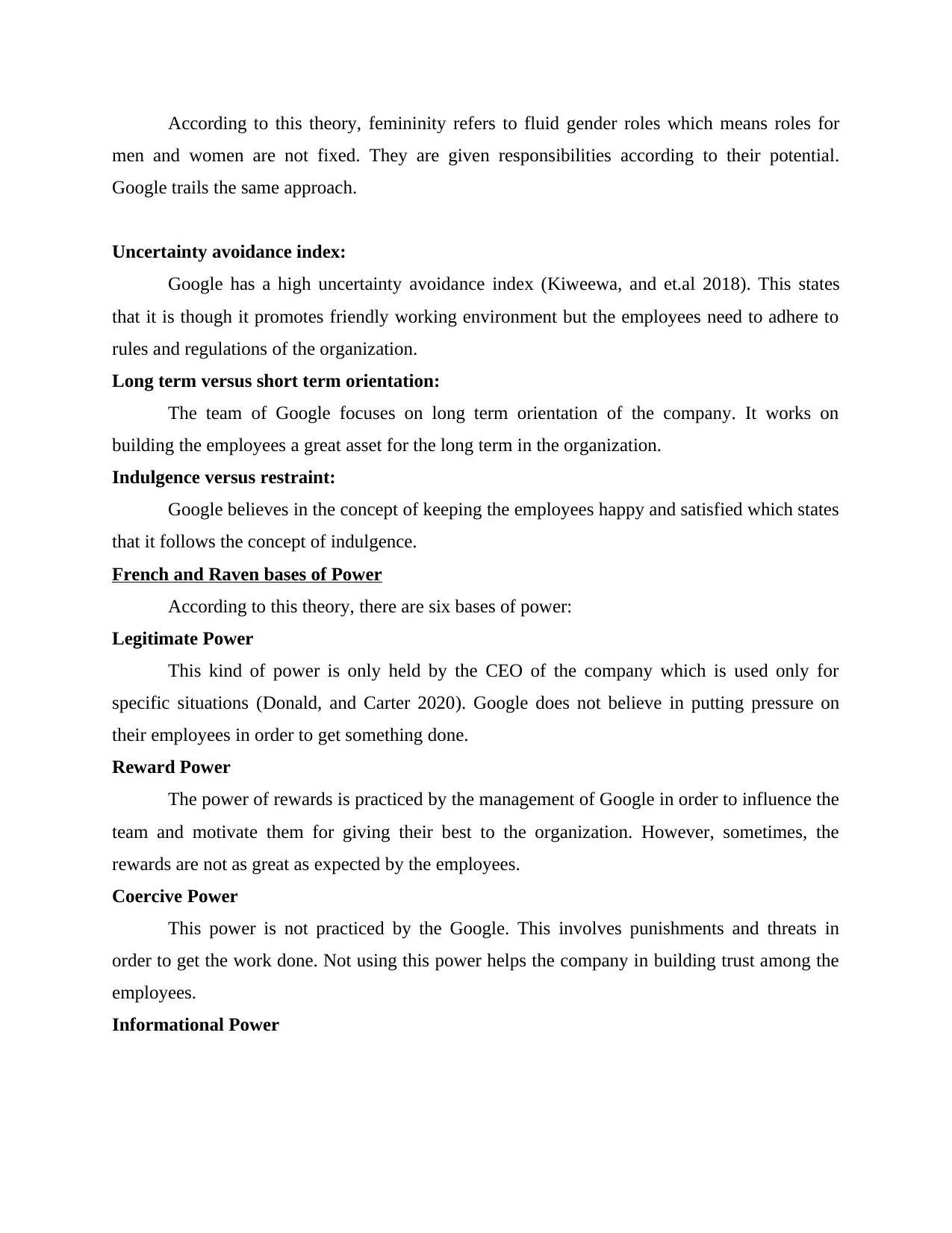
According to this theory, femininity refers to fluid gender roles which means roles for
men and women are not fixed. They are given responsibilities according to their potential.
Google trails the same approach.
Uncertainty avoidance index:
Google has a high uncertainty avoidance index (Kiweewa, and et.al 2018). This states
that it is though it promotes friendly working environment but the employees need to adhere to
rules and regulations of the organization.
Long term versus short term orientation:
The team of Google focuses on long term orientation of the company. It works on
building the employees a great asset for the long term in the organization.
Indulgence versus restraint:
Google believes in the concept of keeping the employees happy and satisfied which states
that it follows the concept of indulgence.
French and Raven bases of Power
According to this theory, there are six bases of power:
Legitimate Power
This kind of power is only held by the CEO of the company which is used only for
specific situations (Donald, and Carter 2020). Google does not believe in putting pressure on
their employees in order to get something done.
Reward Power
The power of rewards is practiced by the management of Google in order to influence the
team and motivate them for giving their best to the organization. However, sometimes, the
rewards are not as great as expected by the employees.
Coercive Power
This power is not practiced by the Google. This involves punishments and threats in
order to get the work done. Not using this power helps the company in building trust among the
employees.
Informational Power
men and women are not fixed. They are given responsibilities according to their potential.
Google trails the same approach.
Uncertainty avoidance index:
Google has a high uncertainty avoidance index (Kiweewa, and et.al 2018). This states
that it is though it promotes friendly working environment but the employees need to adhere to
rules and regulations of the organization.
Long term versus short term orientation:
The team of Google focuses on long term orientation of the company. It works on
building the employees a great asset for the long term in the organization.
Indulgence versus restraint:
Google believes in the concept of keeping the employees happy and satisfied which states
that it follows the concept of indulgence.
French and Raven bases of Power
According to this theory, there are six bases of power:
Legitimate Power
This kind of power is only held by the CEO of the company which is used only for
specific situations (Donald, and Carter 2020). Google does not believe in putting pressure on
their employees in order to get something done.
Reward Power
The power of rewards is practiced by the management of Google in order to influence the
team and motivate them for giving their best to the organization. However, sometimes, the
rewards are not as great as expected by the employees.
Coercive Power
This power is not practiced by the Google. This involves punishments and threats in
order to get the work done. Not using this power helps the company in building trust among the
employees.
Informational Power
Paraphrase This Document
Need a fresh take? Get an instant paraphrase of this document with our AI Paraphraser
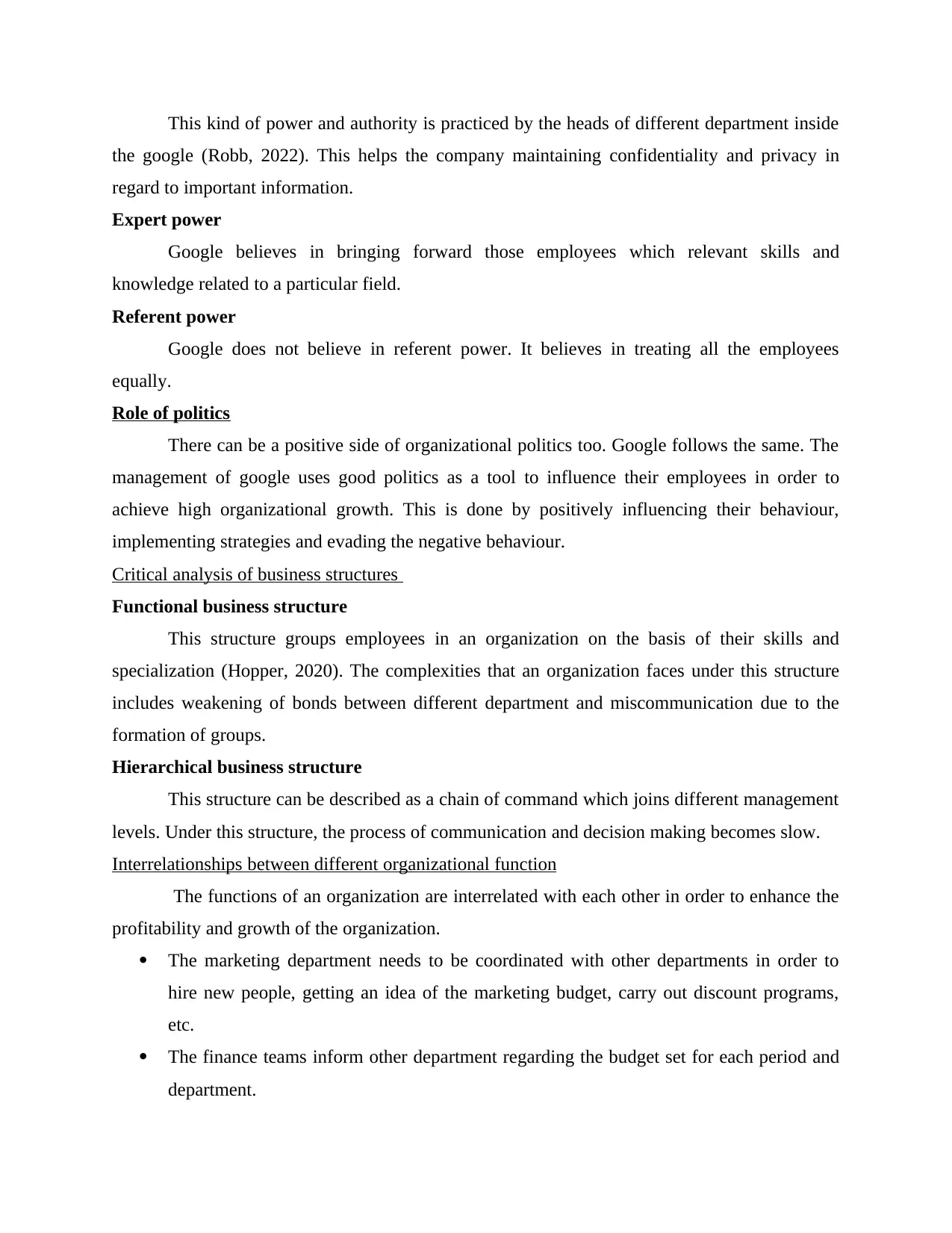
This kind of power and authority is practiced by the heads of different department inside
the google (Robb, 2022). This helps the company maintaining confidentiality and privacy in
regard to important information.
Expert power
Google believes in bringing forward those employees which relevant skills and
knowledge related to a particular field.
Referent power
Google does not believe in referent power. It believes in treating all the employees
equally.
Role of politics
There can be a positive side of organizational politics too. Google follows the same. The
management of google uses good politics as a tool to influence their employees in order to
achieve high organizational growth. This is done by positively influencing their behaviour,
implementing strategies and evading the negative behaviour.
Critical analysis of business structures
Functional business structure
This structure groups employees in an organization on the basis of their skills and
specialization (Hopper, 2020). The complexities that an organization faces under this structure
includes weakening of bonds between different department and miscommunication due to the
formation of groups.
Hierarchical business structure
This structure can be described as a chain of command which joins different management
levels. Under this structure, the process of communication and decision making becomes slow.
Interrelationships between different organizational function
The functions of an organization are interrelated with each other in order to enhance the
profitability and growth of the organization.
The marketing department needs to be coordinated with other departments in order to
hire new people, getting an idea of the marketing budget, carry out discount programs,
etc.
The finance teams inform other department regarding the budget set for each period and
department.
the google (Robb, 2022). This helps the company maintaining confidentiality and privacy in
regard to important information.
Expert power
Google believes in bringing forward those employees which relevant skills and
knowledge related to a particular field.
Referent power
Google does not believe in referent power. It believes in treating all the employees
equally.
Role of politics
There can be a positive side of organizational politics too. Google follows the same. The
management of google uses good politics as a tool to influence their employees in order to
achieve high organizational growth. This is done by positively influencing their behaviour,
implementing strategies and evading the negative behaviour.
Critical analysis of business structures
Functional business structure
This structure groups employees in an organization on the basis of their skills and
specialization (Hopper, 2020). The complexities that an organization faces under this structure
includes weakening of bonds between different department and miscommunication due to the
formation of groups.
Hierarchical business structure
This structure can be described as a chain of command which joins different management
levels. Under this structure, the process of communication and decision making becomes slow.
Interrelationships between different organizational function
The functions of an organization are interrelated with each other in order to enhance the
profitability and growth of the organization.
The marketing department needs to be coordinated with other departments in order to
hire new people, getting an idea of the marketing budget, carry out discount programs,
etc.
The finance teams inform other department regarding the budget set for each period and
department.
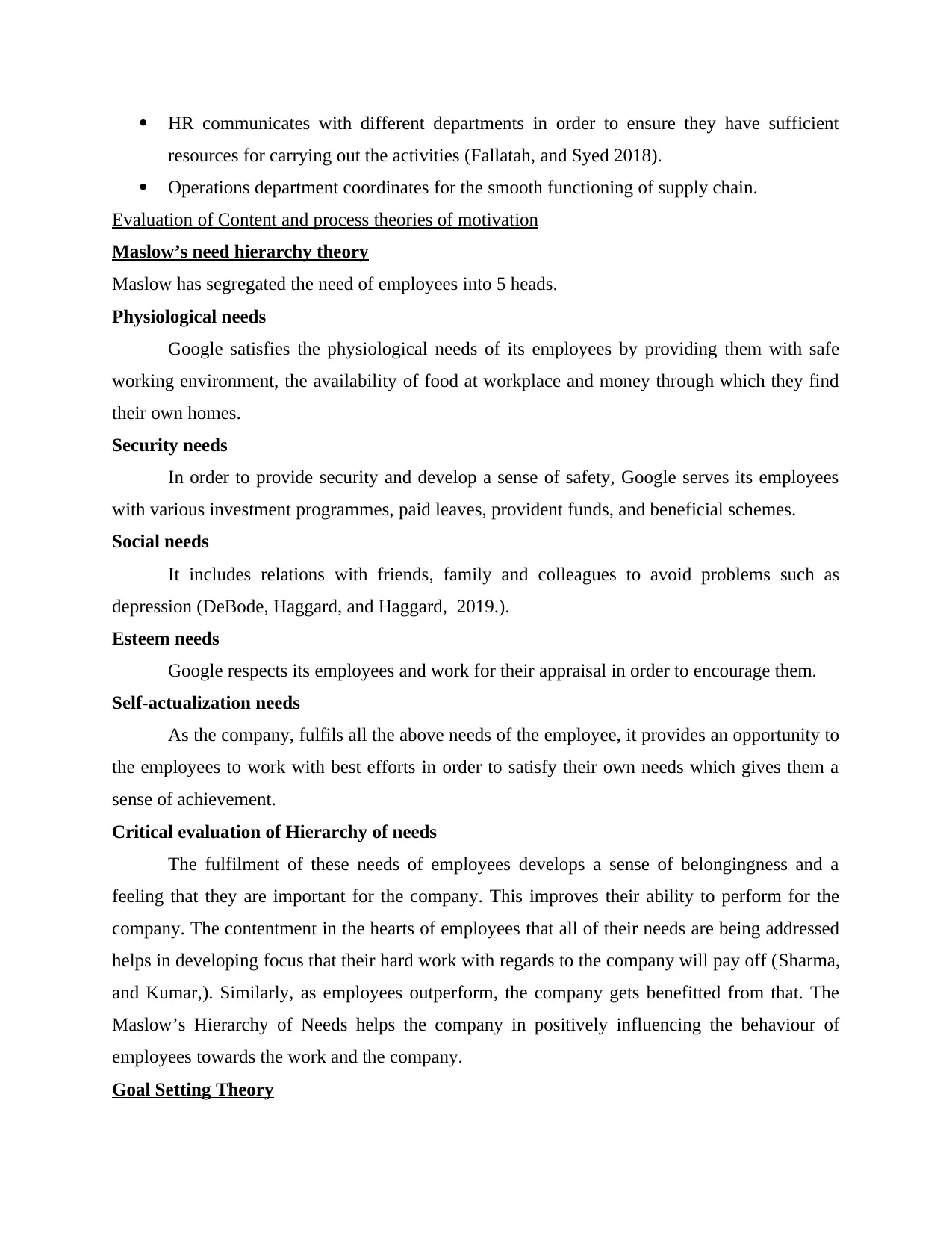
HR communicates with different departments in order to ensure they have sufficient
resources for carrying out the activities (Fallatah, and Syed 2018).
Operations department coordinates for the smooth functioning of supply chain.
Evaluation of Content and process theories of motivation
Maslow’s need hierarchy theory
Maslow has segregated the need of employees into 5 heads.
Physiological needs
Google satisfies the physiological needs of its employees by providing them with safe
working environment, the availability of food at workplace and money through which they find
their own homes.
Security needs
In order to provide security and develop a sense of safety, Google serves its employees
with various investment programmes, paid leaves, provident funds, and beneficial schemes.
Social needs
It includes relations with friends, family and colleagues to avoid problems such as
depression (DeBode, Haggard, and Haggard, 2019.).
Esteem needs
Google respects its employees and work for their appraisal in order to encourage them.
Self-actualization needs
As the company, fulfils all the above needs of the employee, it provides an opportunity to
the employees to work with best efforts in order to satisfy their own needs which gives them a
sense of achievement.
Critical evaluation of Hierarchy of needs
The fulfilment of these needs of employees develops a sense of belongingness and a
feeling that they are important for the company. This improves their ability to perform for the
company. The contentment in the hearts of employees that all of their needs are being addressed
helps in developing focus that their hard work with regards to the company will pay off (Sharma,
and Kumar,). Similarly, as employees outperform, the company gets benefitted from that. The
Maslow’s Hierarchy of Needs helps the company in positively influencing the behaviour of
employees towards the work and the company.
Goal Setting Theory
resources for carrying out the activities (Fallatah, and Syed 2018).
Operations department coordinates for the smooth functioning of supply chain.
Evaluation of Content and process theories of motivation
Maslow’s need hierarchy theory
Maslow has segregated the need of employees into 5 heads.
Physiological needs
Google satisfies the physiological needs of its employees by providing them with safe
working environment, the availability of food at workplace and money through which they find
their own homes.
Security needs
In order to provide security and develop a sense of safety, Google serves its employees
with various investment programmes, paid leaves, provident funds, and beneficial schemes.
Social needs
It includes relations with friends, family and colleagues to avoid problems such as
depression (DeBode, Haggard, and Haggard, 2019.).
Esteem needs
Google respects its employees and work for their appraisal in order to encourage them.
Self-actualization needs
As the company, fulfils all the above needs of the employee, it provides an opportunity to
the employees to work with best efforts in order to satisfy their own needs which gives them a
sense of achievement.
Critical evaluation of Hierarchy of needs
The fulfilment of these needs of employees develops a sense of belongingness and a
feeling that they are important for the company. This improves their ability to perform for the
company. The contentment in the hearts of employees that all of their needs are being addressed
helps in developing focus that their hard work with regards to the company will pay off (Sharma,
and Kumar,). Similarly, as employees outperform, the company gets benefitted from that. The
Maslow’s Hierarchy of Needs helps the company in positively influencing the behaviour of
employees towards the work and the company.
Goal Setting Theory
⊘ This is a preview!⊘
Do you want full access?
Subscribe today to unlock all pages.

Trusted by 1+ million students worldwide
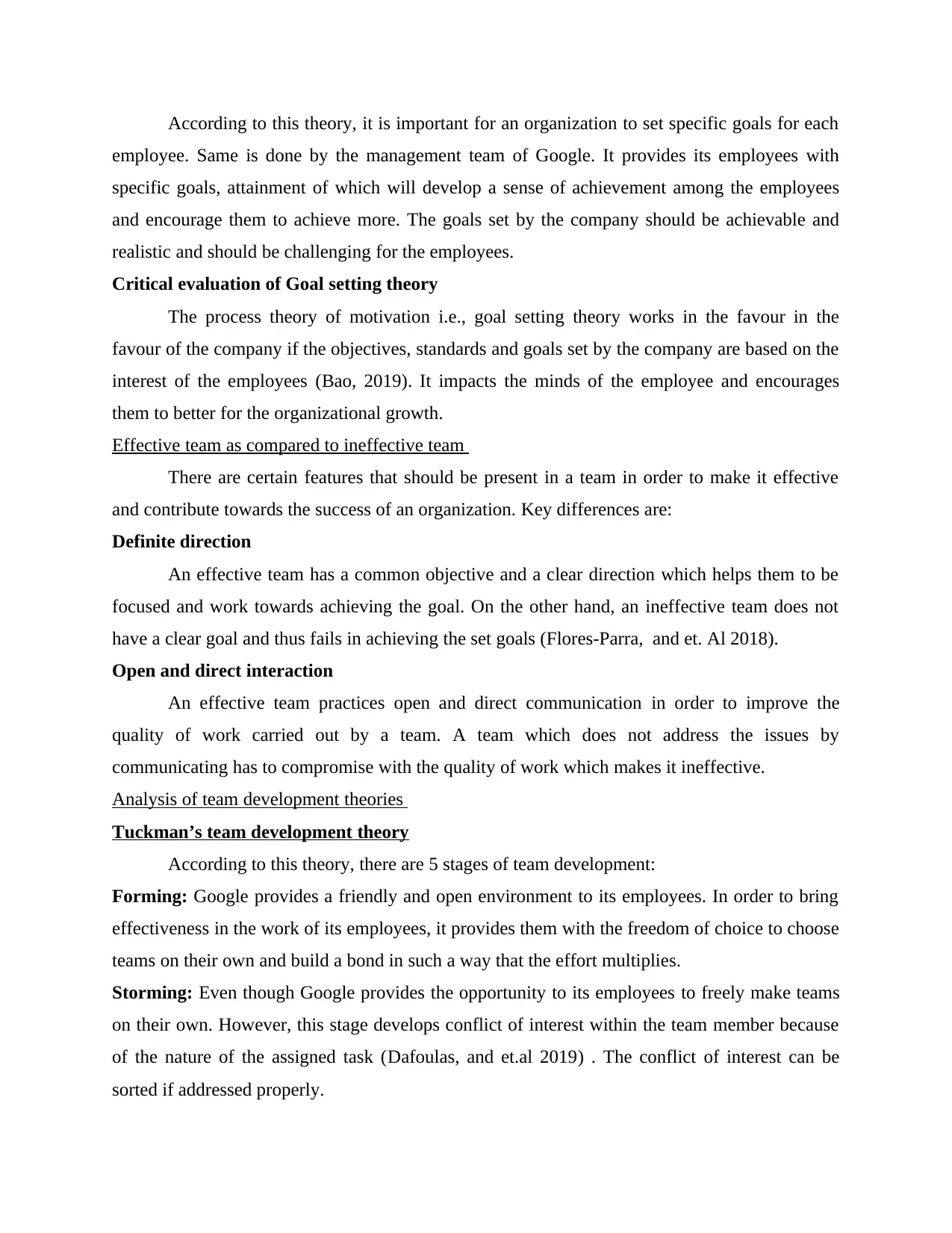
According to this theory, it is important for an organization to set specific goals for each
employee. Same is done by the management team of Google. It provides its employees with
specific goals, attainment of which will develop a sense of achievement among the employees
and encourage them to achieve more. The goals set by the company should be achievable and
realistic and should be challenging for the employees.
Critical evaluation of Goal setting theory
The process theory of motivation i.e., goal setting theory works in the favour in the
favour of the company if the objectives, standards and goals set by the company are based on the
interest of the employees (Bao, 2019). It impacts the minds of the employee and encourages
them to better for the organizational growth.
Effective team as compared to ineffective team
There are certain features that should be present in a team in order to make it effective
and contribute towards the success of an organization. Key differences are:
Definite direction
An effective team has a common objective and a clear direction which helps them to be
focused and work towards achieving the goal. On the other hand, an ineffective team does not
have a clear goal and thus fails in achieving the set goals (Flores-Parra, and et. Al 2018).
Open and direct interaction
An effective team practices open and direct communication in order to improve the
quality of work carried out by a team. A team which does not address the issues by
communicating has to compromise with the quality of work which makes it ineffective.
Analysis of team development theories
Tuckman’s team development theory
According to this theory, there are 5 stages of team development:
Forming: Google provides a friendly and open environment to its employees. In order to bring
effectiveness in the work of its employees, it provides them with the freedom of choice to choose
teams on their own and build a bond in such a way that the effort multiplies.
Storming: Even though Google provides the opportunity to its employees to freely make teams
on their own. However, this stage develops conflict of interest within the team member because
of the nature of the assigned task (Dafoulas, and et.al 2019) . The conflict of interest can be
sorted if addressed properly.
employee. Same is done by the management team of Google. It provides its employees with
specific goals, attainment of which will develop a sense of achievement among the employees
and encourage them to achieve more. The goals set by the company should be achievable and
realistic and should be challenging for the employees.
Critical evaluation of Goal setting theory
The process theory of motivation i.e., goal setting theory works in the favour in the
favour of the company if the objectives, standards and goals set by the company are based on the
interest of the employees (Bao, 2019). It impacts the minds of the employee and encourages
them to better for the organizational growth.
Effective team as compared to ineffective team
There are certain features that should be present in a team in order to make it effective
and contribute towards the success of an organization. Key differences are:
Definite direction
An effective team has a common objective and a clear direction which helps them to be
focused and work towards achieving the goal. On the other hand, an ineffective team does not
have a clear goal and thus fails in achieving the set goals (Flores-Parra, and et. Al 2018).
Open and direct interaction
An effective team practices open and direct communication in order to improve the
quality of work carried out by a team. A team which does not address the issues by
communicating has to compromise with the quality of work which makes it ineffective.
Analysis of team development theories
Tuckman’s team development theory
According to this theory, there are 5 stages of team development:
Forming: Google provides a friendly and open environment to its employees. In order to bring
effectiveness in the work of its employees, it provides them with the freedom of choice to choose
teams on their own and build a bond in such a way that the effort multiplies.
Storming: Even though Google provides the opportunity to its employees to freely make teams
on their own. However, this stage develops conflict of interest within the team member because
of the nature of the assigned task (Dafoulas, and et.al 2019) . The conflict of interest can be
sorted if addressed properly.
Paraphrase This Document
Need a fresh take? Get an instant paraphrase of this document with our AI Paraphraser
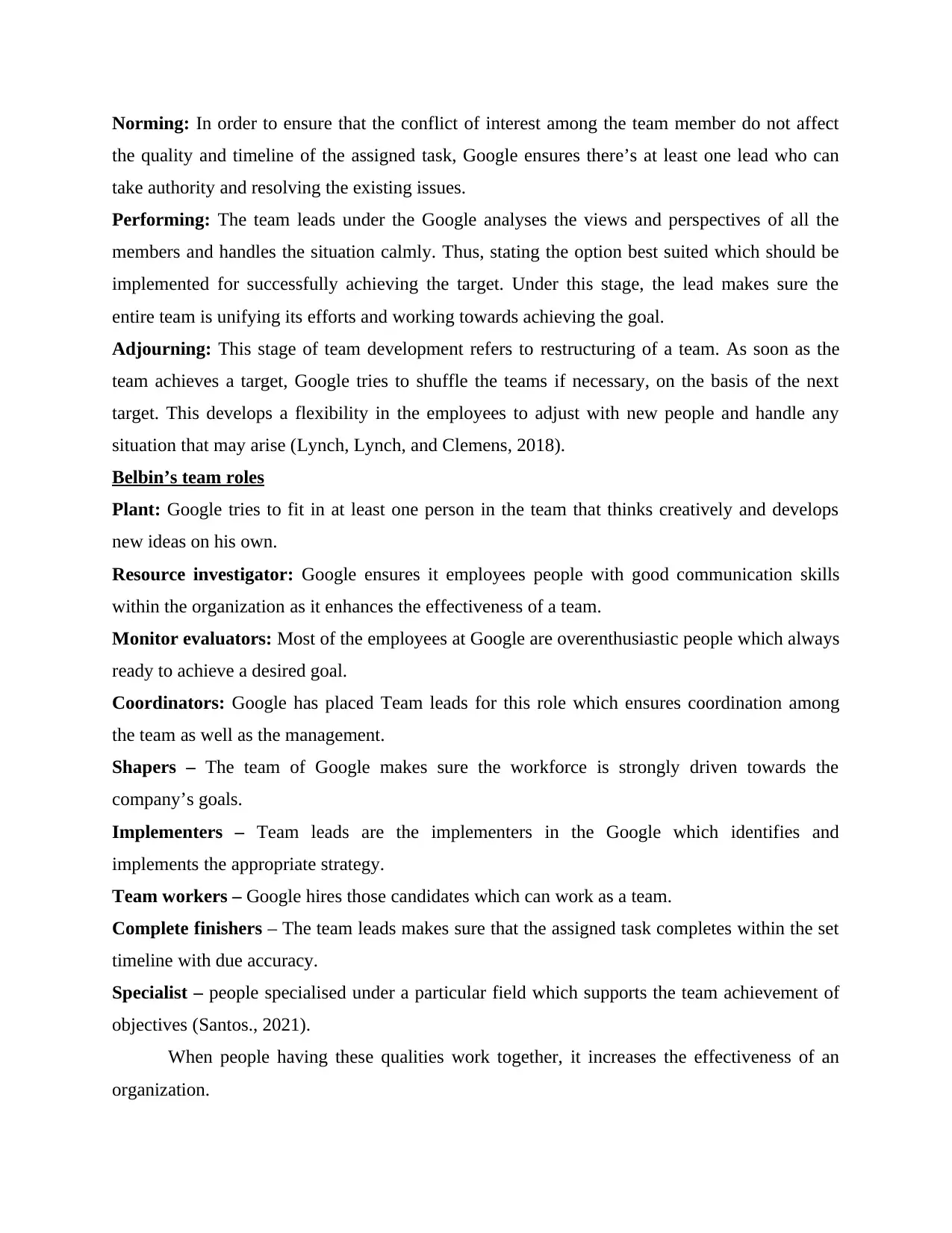
Norming: In order to ensure that the conflict of interest among the team member do not affect
the quality and timeline of the assigned task, Google ensures there’s at least one lead who can
take authority and resolving the existing issues.
Performing: The team leads under the Google analyses the views and perspectives of all the
members and handles the situation calmly. Thus, stating the option best suited which should be
implemented for successfully achieving the target. Under this stage, the lead makes sure the
entire team is unifying its efforts and working towards achieving the goal.
Adjourning: This stage of team development refers to restructuring of a team. As soon as the
team achieves a target, Google tries to shuffle the teams if necessary, on the basis of the next
target. This develops a flexibility in the employees to adjust with new people and handle any
situation that may arise (Lynch, Lynch, and Clemens, 2018).
Belbin’s team roles
Plant: Google tries to fit in at least one person in the team that thinks creatively and develops
new ideas on his own.
Resource investigator: Google ensures it employees people with good communication skills
within the organization as it enhances the effectiveness of a team.
Monitor evaluators: Most of the employees at Google are overenthusiastic people which always
ready to achieve a desired goal.
Coordinators: Google has placed Team leads for this role which ensures coordination among
the team as well as the management.
Shapers – The team of Google makes sure the workforce is strongly driven towards the
company’s goals.
Implementers – Team leads are the implementers in the Google which identifies and
implements the appropriate strategy.
Team workers – Google hires those candidates which can work as a team.
Complete finishers – The team leads makes sure that the assigned task completes within the set
timeline with due accuracy.
Specialist – people specialised under a particular field which supports the team achievement of
objectives (Santos., 2021).
When people having these qualities work together, it increases the effectiveness of an
organization.
the quality and timeline of the assigned task, Google ensures there’s at least one lead who can
take authority and resolving the existing issues.
Performing: The team leads under the Google analyses the views and perspectives of all the
members and handles the situation calmly. Thus, stating the option best suited which should be
implemented for successfully achieving the target. Under this stage, the lead makes sure the
entire team is unifying its efforts and working towards achieving the goal.
Adjourning: This stage of team development refers to restructuring of a team. As soon as the
team achieves a target, Google tries to shuffle the teams if necessary, on the basis of the next
target. This develops a flexibility in the employees to adjust with new people and handle any
situation that may arise (Lynch, Lynch, and Clemens, 2018).
Belbin’s team roles
Plant: Google tries to fit in at least one person in the team that thinks creatively and develops
new ideas on his own.
Resource investigator: Google ensures it employees people with good communication skills
within the organization as it enhances the effectiveness of a team.
Monitor evaluators: Most of the employees at Google are overenthusiastic people which always
ready to achieve a desired goal.
Coordinators: Google has placed Team leads for this role which ensures coordination among
the team as well as the management.
Shapers – The team of Google makes sure the workforce is strongly driven towards the
company’s goals.
Implementers – Team leads are the implementers in the Google which identifies and
implements the appropriate strategy.
Team workers – Google hires those candidates which can work as a team.
Complete finishers – The team leads makes sure that the assigned task completes within the set
timeline with due accuracy.
Specialist – people specialised under a particular field which supports the team achievement of
objectives (Santos., 2021).
When people having these qualities work together, it increases the effectiveness of an
organization.
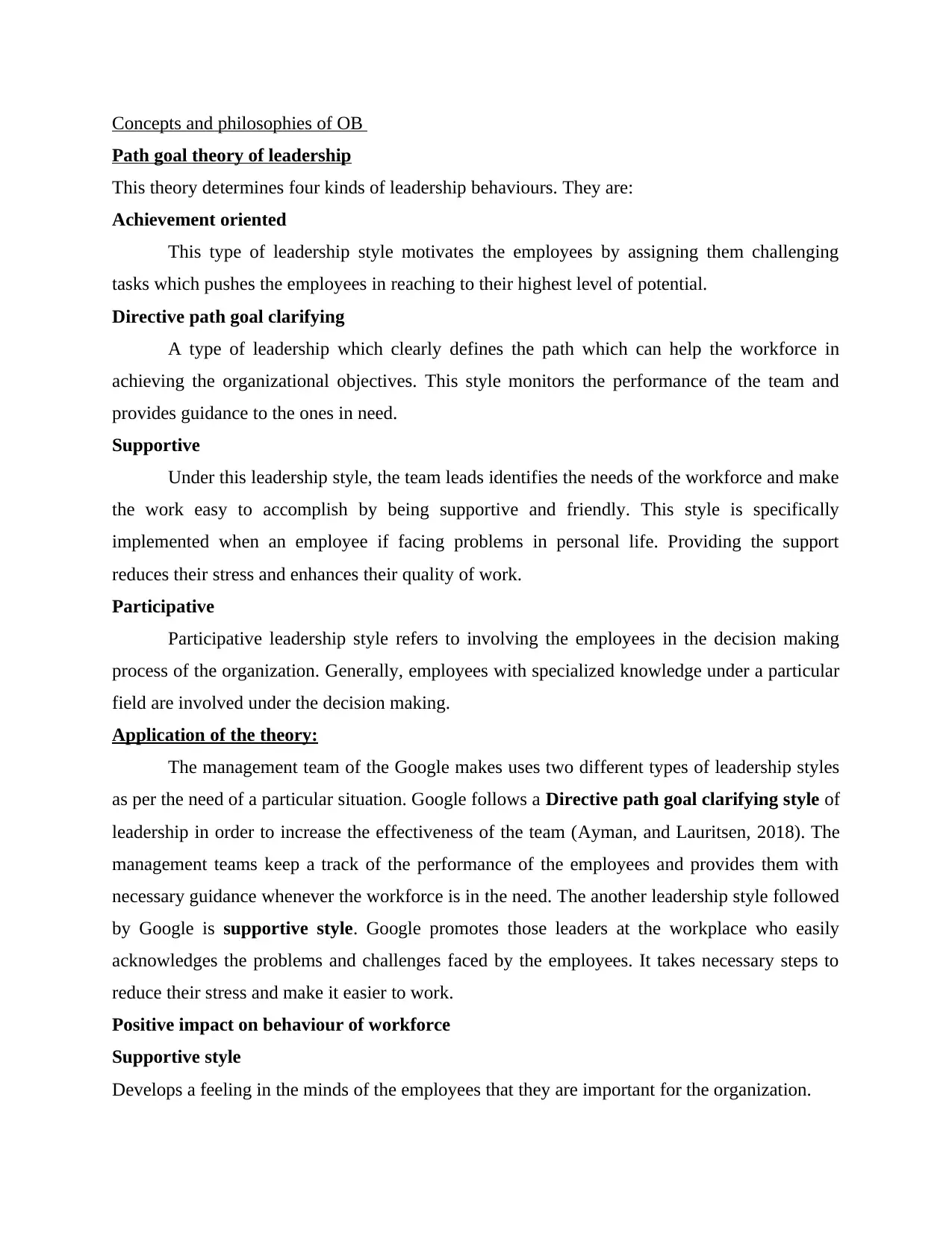
Concepts and philosophies of OB
Path goal theory of leadership
This theory determines four kinds of leadership behaviours. They are:
Achievement oriented
This type of leadership style motivates the employees by assigning them challenging
tasks which pushes the employees in reaching to their highest level of potential.
Directive path goal clarifying
A type of leadership which clearly defines the path which can help the workforce in
achieving the organizational objectives. This style monitors the performance of the team and
provides guidance to the ones in need.
Supportive
Under this leadership style, the team leads identifies the needs of the workforce and make
the work easy to accomplish by being supportive and friendly. This style is specifically
implemented when an employee if facing problems in personal life. Providing the support
reduces their stress and enhances their quality of work.
Participative
Participative leadership style refers to involving the employees in the decision making
process of the organization. Generally, employees with specialized knowledge under a particular
field are involved under the decision making.
Application of the theory:
The management team of the Google makes uses two different types of leadership styles
as per the need of a particular situation. Google follows a Directive path goal clarifying style of
leadership in order to increase the effectiveness of the team (Ayman, and Lauritsen, 2018). The
management teams keep a track of the performance of the employees and provides them with
necessary guidance whenever the workforce is in the need. The another leadership style followed
by Google is supportive style. Google promotes those leaders at the workplace who easily
acknowledges the problems and challenges faced by the employees. It takes necessary steps to
reduce their stress and make it easier to work.
Positive impact on behaviour of workforce
Supportive style
Develops a feeling in the minds of the employees that they are important for the organization.
Path goal theory of leadership
This theory determines four kinds of leadership behaviours. They are:
Achievement oriented
This type of leadership style motivates the employees by assigning them challenging
tasks which pushes the employees in reaching to their highest level of potential.
Directive path goal clarifying
A type of leadership which clearly defines the path which can help the workforce in
achieving the organizational objectives. This style monitors the performance of the team and
provides guidance to the ones in need.
Supportive
Under this leadership style, the team leads identifies the needs of the workforce and make
the work easy to accomplish by being supportive and friendly. This style is specifically
implemented when an employee if facing problems in personal life. Providing the support
reduces their stress and enhances their quality of work.
Participative
Participative leadership style refers to involving the employees in the decision making
process of the organization. Generally, employees with specialized knowledge under a particular
field are involved under the decision making.
Application of the theory:
The management team of the Google makes uses two different types of leadership styles
as per the need of a particular situation. Google follows a Directive path goal clarifying style of
leadership in order to increase the effectiveness of the team (Ayman, and Lauritsen, 2018). The
management teams keep a track of the performance of the employees and provides them with
necessary guidance whenever the workforce is in the need. The another leadership style followed
by Google is supportive style. Google promotes those leaders at the workplace who easily
acknowledges the problems and challenges faced by the employees. It takes necessary steps to
reduce their stress and make it easier to work.
Positive impact on behaviour of workforce
Supportive style
Develops a feeling in the minds of the employees that they are important for the organization.
⊘ This is a preview!⊘
Do you want full access?
Subscribe today to unlock all pages.

Trusted by 1+ million students worldwide
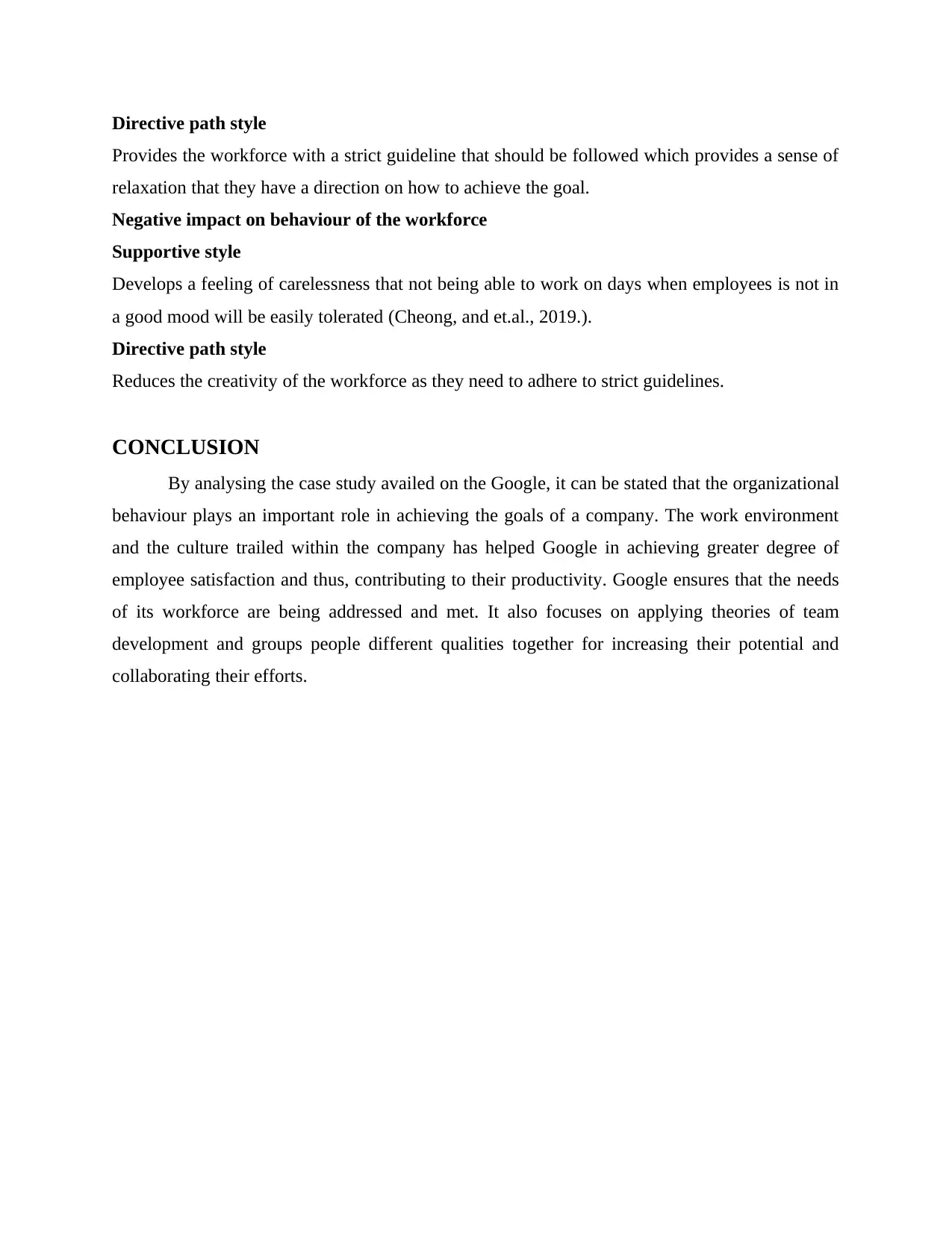
Directive path style
Provides the workforce with a strict guideline that should be followed which provides a sense of
relaxation that they have a direction on how to achieve the goal.
Negative impact on behaviour of the workforce
Supportive style
Develops a feeling of carelessness that not being able to work on days when employees is not in
a good mood will be easily tolerated (Cheong, and et.al., 2019.).
Directive path style
Reduces the creativity of the workforce as they need to adhere to strict guidelines.
CONCLUSION
By analysing the case study availed on the Google, it can be stated that the organizational
behaviour plays an important role in achieving the goals of a company. The work environment
and the culture trailed within the company has helped Google in achieving greater degree of
employee satisfaction and thus, contributing to their productivity. Google ensures that the needs
of its workforce are being addressed and met. It also focuses on applying theories of team
development and groups people different qualities together for increasing their potential and
collaborating their efforts.
Provides the workforce with a strict guideline that should be followed which provides a sense of
relaxation that they have a direction on how to achieve the goal.
Negative impact on behaviour of the workforce
Supportive style
Develops a feeling of carelessness that not being able to work on days when employees is not in
a good mood will be easily tolerated (Cheong, and et.al., 2019.).
Directive path style
Reduces the creativity of the workforce as they need to adhere to strict guidelines.
CONCLUSION
By analysing the case study availed on the Google, it can be stated that the organizational
behaviour plays an important role in achieving the goals of a company. The work environment
and the culture trailed within the company has helped Google in achieving greater degree of
employee satisfaction and thus, contributing to their productivity. Google ensures that the needs
of its workforce are being addressed and met. It also focuses on applying theories of team
development and groups people different qualities together for increasing their potential and
collaborating their efforts.
Paraphrase This Document
Need a fresh take? Get an instant paraphrase of this document with our AI Paraphraser
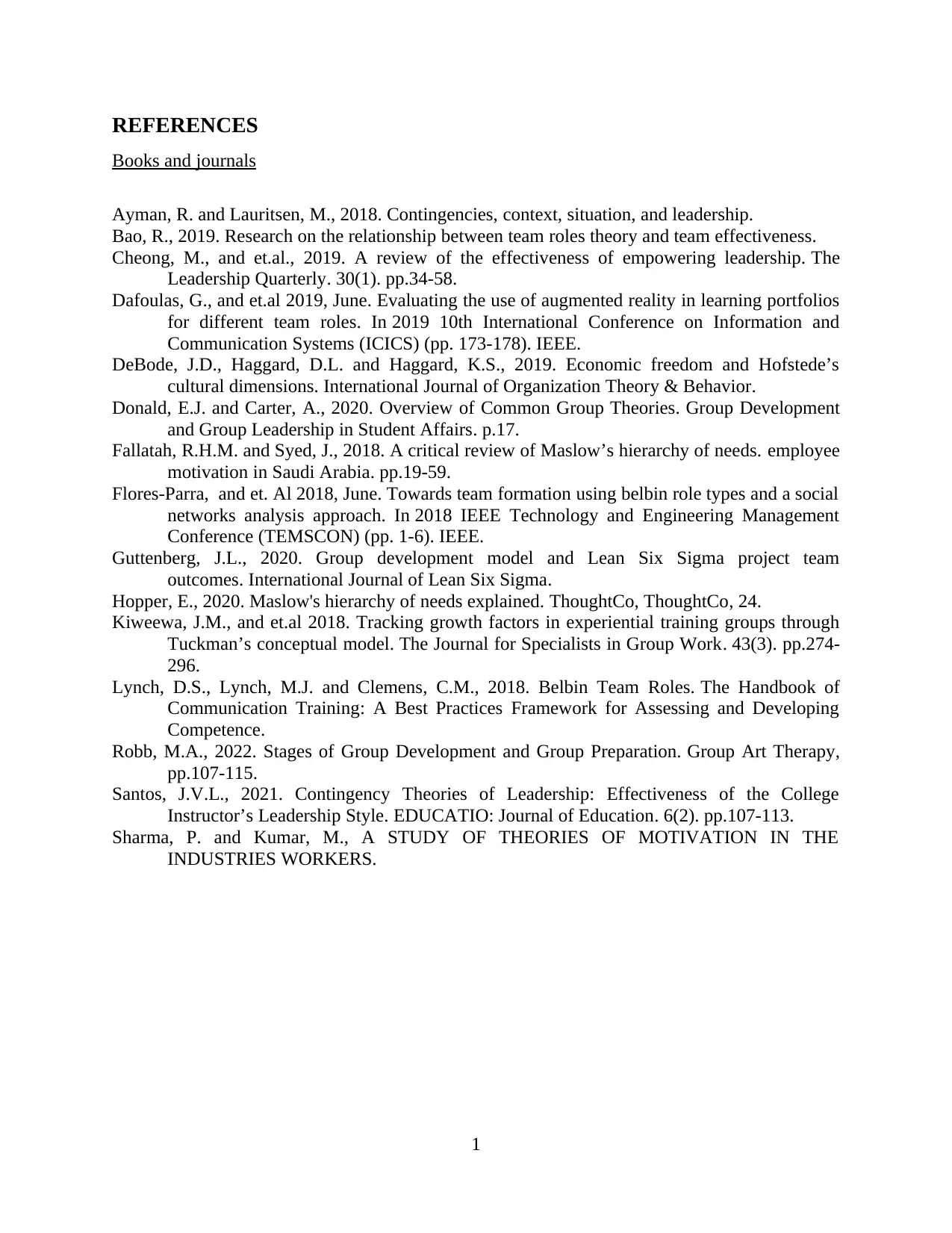
REFERENCES
Books and journals
Ayman, R. and Lauritsen, M., 2018. Contingencies, context, situation, and leadership.
Bao, R., 2019. Research on the relationship between team roles theory and team effectiveness.
Cheong, M., and et.al., 2019. A review of the effectiveness of empowering leadership. The
Leadership Quarterly. 30(1). pp.34-58.
Dafoulas, G., and et.al 2019, June. Evaluating the use of augmented reality in learning portfolios
for different team roles. In 2019 10th International Conference on Information and
Communication Systems (ICICS) (pp. 173-178). IEEE.
DeBode, J.D., Haggard, D.L. and Haggard, K.S., 2019. Economic freedom and Hofstede’s
cultural dimensions. International Journal of Organization Theory & Behavior.
Donald, E.J. and Carter, A., 2020. Overview of Common Group Theories. Group Development
and Group Leadership in Student Affairs. p.17.
Fallatah, R.H.M. and Syed, J., 2018. A critical review of Maslow’s hierarchy of needs. employee
motivation in Saudi Arabia. pp.19-59.
Flores-Parra, and et. Al 2018, June. Towards team formation using belbin role types and a social
networks analysis approach. In 2018 IEEE Technology and Engineering Management
Conference (TEMSCON) (pp. 1-6). IEEE.
Guttenberg, J.L., 2020. Group development model and Lean Six Sigma project team
outcomes. International Journal of Lean Six Sigma.
Hopper, E., 2020. Maslow's hierarchy of needs explained. ThoughtCo, ThoughtCo, 24.
Kiweewa, J.M., and et.al 2018. Tracking growth factors in experiential training groups through
Tuckman’s conceptual model. The Journal for Specialists in Group Work. 43(3). pp.274-
296.
Lynch, D.S., Lynch, M.J. and Clemens, C.M., 2018. Belbin Team Roles. The Handbook of
Communication Training: A Best Practices Framework for Assessing and Developing
Competence.
Robb, M.A., 2022. Stages of Group Development and Group Preparation. Group Art Therapy,
pp.107-115.
Santos, J.V.L., 2021. Contingency Theories of Leadership: Effectiveness of the College
Instructor’s Leadership Style. EDUCATIO: Journal of Education. 6(2). pp.107-113.
Sharma, P. and Kumar, M., A STUDY OF THEORIES OF MOTIVATION IN THE
INDUSTRIES WORKERS.
1
Books and journals
Ayman, R. and Lauritsen, M., 2018. Contingencies, context, situation, and leadership.
Bao, R., 2019. Research on the relationship between team roles theory and team effectiveness.
Cheong, M., and et.al., 2019. A review of the effectiveness of empowering leadership. The
Leadership Quarterly. 30(1). pp.34-58.
Dafoulas, G., and et.al 2019, June. Evaluating the use of augmented reality in learning portfolios
for different team roles. In 2019 10th International Conference on Information and
Communication Systems (ICICS) (pp. 173-178). IEEE.
DeBode, J.D., Haggard, D.L. and Haggard, K.S., 2019. Economic freedom and Hofstede’s
cultural dimensions. International Journal of Organization Theory & Behavior.
Donald, E.J. and Carter, A., 2020. Overview of Common Group Theories. Group Development
and Group Leadership in Student Affairs. p.17.
Fallatah, R.H.M. and Syed, J., 2018. A critical review of Maslow’s hierarchy of needs. employee
motivation in Saudi Arabia. pp.19-59.
Flores-Parra, and et. Al 2018, June. Towards team formation using belbin role types and a social
networks analysis approach. In 2018 IEEE Technology and Engineering Management
Conference (TEMSCON) (pp. 1-6). IEEE.
Guttenberg, J.L., 2020. Group development model and Lean Six Sigma project team
outcomes. International Journal of Lean Six Sigma.
Hopper, E., 2020. Maslow's hierarchy of needs explained. ThoughtCo, ThoughtCo, 24.
Kiweewa, J.M., and et.al 2018. Tracking growth factors in experiential training groups through
Tuckman’s conceptual model. The Journal for Specialists in Group Work. 43(3). pp.274-
296.
Lynch, D.S., Lynch, M.J. and Clemens, C.M., 2018. Belbin Team Roles. The Handbook of
Communication Training: A Best Practices Framework for Assessing and Developing
Competence.
Robb, M.A., 2022. Stages of Group Development and Group Preparation. Group Art Therapy,
pp.107-115.
Santos, J.V.L., 2021. Contingency Theories of Leadership: Effectiveness of the College
Instructor’s Leadership Style. EDUCATIO: Journal of Education. 6(2). pp.107-113.
Sharma, P. and Kumar, M., A STUDY OF THEORIES OF MOTIVATION IN THE
INDUSTRIES WORKERS.
1
1 out of 11
Related Documents
Your All-in-One AI-Powered Toolkit for Academic Success.
+13062052269
info@desklib.com
Available 24*7 on WhatsApp / Email
![[object Object]](/_next/static/media/star-bottom.7253800d.svg)
Unlock your academic potential
Copyright © 2020–2026 A2Z Services. All Rights Reserved. Developed and managed by ZUCOL.


